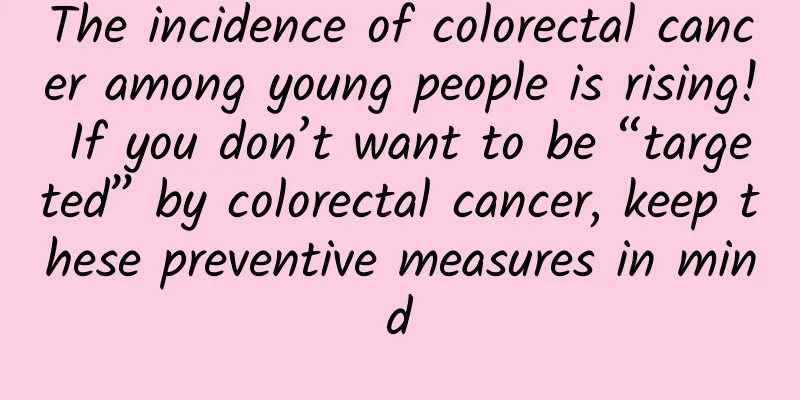The incidence of colorectal cancer among young people is rising! If you don’t want to be “targeted” by colorectal cancer, keep these preventive measures in mind

|
In recent years, the increasing incidence of colorectal cancer among young people has attracted widespread attention. Recently, a study published in The Lancet Oncology showed that the incidence of colorectal cancer in people under 50 years old is increasing year by year worldwide. The study analyzed data from 50 countries between 2007 and 2017 and found that the incidence of colorectal cancer among young people continued to rise in 27 of these countries, most of which were developed countries or some developing countries. For example, in England, the incidence of colorectal cancer among people aged 20 to 39 has increased significantly over the past few decades, increasing by approximately 3.6% per year. Experts from Hunan Provincial Cancer Hospital said that bad eating habits are one of the main risk factors for colorectal cancer. Bad eating habits include long-term high-fat, high-protein diet, especially frequent consumption of fried, smoked and processed meats, as well as lack of dietary fiber intake and excessive drinking. Therefore, we should take the following positive measures to reduce the risk of colorectal cancer through scientific diet and healthy habits. 1. Reduce your intake of processed meat The World Health Organization (WHO) has classified processed meat as a Class 1 carcinogen, clearly stating that the intake of processed meat is closely related to an increased risk of colorectal cancer. Processed meats such as sausages, ham and bacon may contain carcinogens such as nitrites and nitrosamines during the production process. Studies have shown that consuming 50 grams of processed meat per day increases the risk of colorectal cancer by 18%. Therefore, it is recommended to reduce the intake of processed meat and choose fresh meat, fish or plant-based proteins (such as beans and nuts) as an important step to reduce the risk of cancer. 2. Increase dietary fiber intake Dietary fiber can promote intestinal health, improve digestion, and help eliminate potential harmful substances. According to a report by the World Cancer Research Fund (WCRF) and the American Institute for Cancer Research (AICR), dietary fiber can speed up intestinal motility and reduce the retention time of harmful substances in the intestine, thereby reducing the risk of colorectal cancer. Studies have also shown that eating a fiber-rich diet can promote healthy intestinal flora and further protect the intestine from cancer. Fiber-rich foods include whole grains (such as oats, brown rice), fresh vegetables (such as broccoli, carrots) and fruits (such as apples and pears). It is recommended that adults consume 25-30 grams of dietary fiber per day. 3. Control weight and improve obesity diet Obesity is recognized as a high-risk factor for colorectal cancer. Many epidemiological studies have found that people who are overweight have a higher risk of colorectal cancer. In particular, abdominal obesity is closely related to the risk of colorectal cancer. Maintaining a healthy weight, exercising moderately, and avoiding excessive intake of high-calorie, high-fat foods can effectively reduce the risk of colorectal cancer related to obesity. 4. Quit smoking and limit alcohol consumption Smoking and excessive drinking have been shown to be important risk factors for colorectal cancer. Carcinogens in tobacco and acetaldehyde produced during alcohol metabolism both increase the risk of colorectal cancer. Studies have shown that long-term drinking and smoking can cause DNA damage in intestinal cells and increase the risk of cancer. In order to reduce the risk of intestinal cancer, it is recommended to quit smoking and limit alcohol intake, with men consuming no more than two glasses of alcohol a day and women no more than one glass. 5. Develop healthy eating habits According to the World Health Organization's cancer prevention guidelines, in addition to the above measures, it is also important to maintain a balanced diet. The diet should include abundant vegetables, fruits, whole grains, and a moderate amount of healthy fats (such as olive oil, nuts, etc.). Try to avoid excessive intake of unhealthy foods such as high-salt, high-sugar, high-fat, fried, refined carbohydrates, etc. At the same time, increasing the intake of foods rich in antioxidants, such as tomatoes, green tea, berries, etc., can also help reduce the risk of colon cancer. Hunan Medical Chat Special Author: Yang Shuo from Hunan Cancer Hospital Follow @湖南医聊 to get more health science information! (Edited by YT) |
>>: After the Spring Festival dinner, your stomach "strikes"? 4 tips to help you recover
Recommend
How to treat acne on women’s faces? 6 ways to get rid of acne
Once a woman gets acne on her face, it will not o...
Brown marks from curling iron burns
Girls all love beauty. When dressing themselves u...
Taboos of the empty month
What does it mean to have an empty confinement pe...
What is the movie My Country about? Is My Country good?
Every year during the National Day, there are som...
What is uterine prolapse?
Uterine prolapse is a relatively common gynecolog...
How much formaldehyde is considered excessive? What is the state of formaldehyde under standard conditions?
Every corner of our lives may release formaldehyd...
What is the reason for a long first menstrual period after abortion?
Every family has different views and attitudes to...
What are these small bumps around my chest?
It is well known that women's breast health i...
Methods for preventing and treating postpartum diseases
Women should pay attention to all aspects of thei...
Milk is for calves, not humans? Nine myths and facts about dairy products →
Dairy products are very nutritious and can be an ...
Delayed menstruation makes people feel tired and sleepy
Menstruation is a physiological condition that oc...
How does Gongjingyankang suppository treat cervical erosion?
Cervical erosion is a common disease among women....
What does a positive vaginal discharge mean?
The problem of BV positive leucorrhea is a proble...
What are the rehabilitation training methods for pelvic floor muscles?
There are two things that every woman has to go t...
What is the most effective food for insomnia? These two foods will help you have sweet dreams!
Many female friends are accustomed to insomnia wh...









